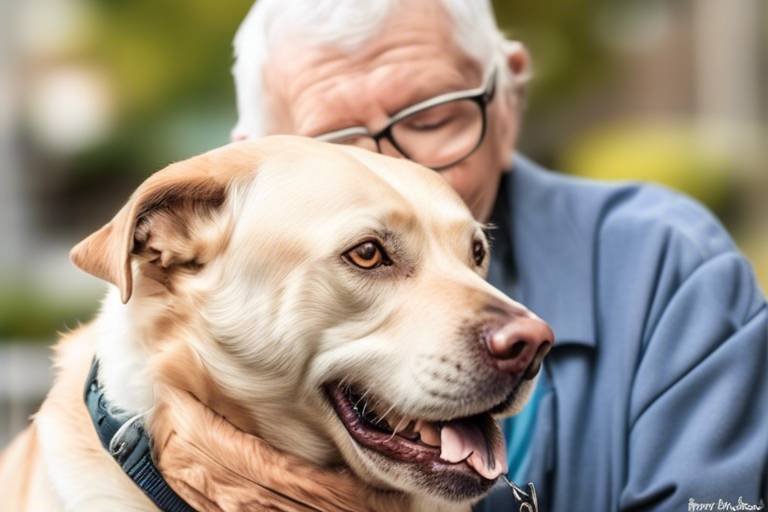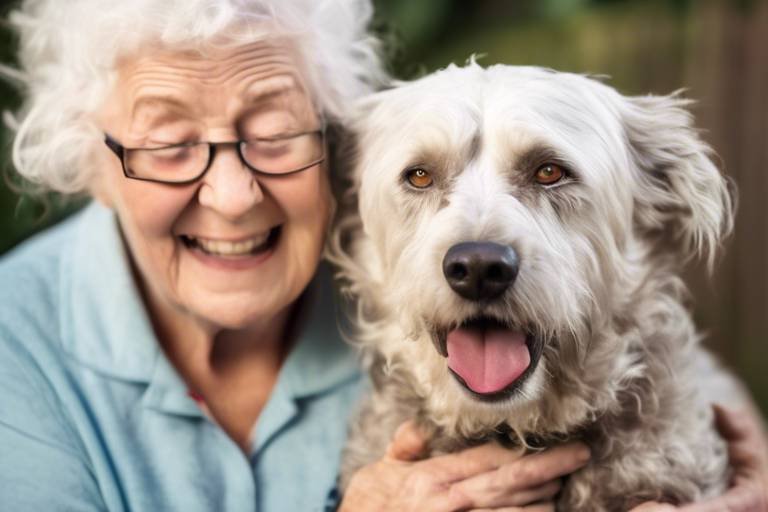How to Help Your Senior Pet Stay Mentally Sharp
As our furry companions age, it’s essential to ensure they remain mentally sharp and engaged. Just like humans, pets can experience cognitive decline, which can lead to behavioral changes and a reduced quality of life. But fear not! There are numerous strategies you can employ to keep your senior pet's mind active and vibrant. In this article, we’ll explore effective methods that not only stimulate their brains but also enhance their overall happiness. After all, a mentally stimulated pet is a happy pet!
Recognizing the signs of cognitive decline in senior pets is crucial. Just as you might notice a loved one becoming forgetful or confused, your pet may exhibit similar symptoms. Common signs include disorientation, disrupted sleeping patterns, changes in appetite, and an increase in anxiety or irritability. If you notice your pet wandering aimlessly or forgetting familiar commands, it might be time to reassess their mental health. Understanding these signs can help you take proactive steps to improve their cognitive function and overall quality of life.
Mental stimulation is vital for senior pets, just as exercise is essential for their physical health. Engaging your pet in various activities can help prevent cognitive decline and keep their minds sharp. Think of it as a workout for their brain! Activities can range from simple games to more complex tasks that challenge their problem-solving abilities. By incorporating regular mental exercises into your pet's routine, you can significantly enhance their cognitive skills and emotional well-being.
Interactive toys can provide hours of mental engagement for senior pets. These toys are designed to challenge your pet’s intellect and keep them entertained. Some of the best options include:
- Interactive Puzzle Toys: These toys require pets to solve puzzles to access treats, stimulating their minds while rewarding them with tasty rewards.
- Snuffle Mats: These mats encourage pets to use their noses to find hidden treats, mimicking natural foraging behavior.
- Automated Ball Launchers: These fun gadgets can keep your pet active and engaged, allowing them to chase balls without requiring constant human involvement.
Puzzle feeders are an excellent way to combine feeding time with mental exercise. These devices challenge your pet to think critically about how to access their food, which can stimulate their problem-solving skills. By making mealtime a fun and engaging experience, you help your pet stay mentally active. Plus, it can slow down fast eaters, promoting better digestion!
Short, positive training sessions can be beneficial for cognitive health. Teaching new tricks or reinforcing old ones can keep your pet sharp and focused. Think of it as a fun game where both you and your pet can bond while learning something new. Be sure to keep sessions brief and filled with praise and treats to maintain their interest and motivation.
Socialization plays a key role in a pet's mental well-being. Regular playdates with other pets or interactions with humans can provide essential mental stimulation. Just like us, pets thrive on social interaction. Consider organizing playdates or visiting dog parks to allow your pet to socialize and engage with others. This not only helps them stay mentally sharp but also combats loneliness and anxiety.
A balanced diet is essential for maintaining cognitive function in senior pets. Just as we require the right nutrients to support our brain health, so do our pets. Foods rich in antioxidants, omega-3 fatty acids, and vitamins can help promote brain health and cognitive longevity. Look for high-quality pet food that lists these nutrients, or consider consulting your veterinarian for dietary recommendations tailored to your pet’s specific needs.
Certain supplements can enhance brain function in senior pets. Some popular options include:
- Omega-3 Fatty Acids: Known for their anti-inflammatory properties, these can support brain health and improve cognitive function.
- Antioxidants: Supplements like vitamin E and C can help protect brain cells from damage.
- Phosphatidylserine: This supplement may help improve memory and cognitive function in aging pets.
Regular veterinary check-ups can provide insights into your pet's mental health. Your veterinarian can help assess your pet’s cognitive abilities and recommend appropriate strategies or treatments to maintain their mental sharpness. It’s always best to have professional guidance when it comes to your pet's health, ensuring you provide the best care possible.
Q: How can I tell if my senior pet is experiencing cognitive decline?
A: Look for signs such as disorientation, changes in sleeping patterns, increased anxiety, or forgetting commands.
Q: Are there specific toys that are best for senior pets?
A: Yes! Interactive puzzle toys, snuffle mats, and automated ball launchers are excellent choices for stimulating their minds.
Q: What dietary changes should I consider for my aging pet?
A: A diet rich in antioxidants, omega-3 fatty acids, and essential vitamins can help support cognitive health.

Understanding Cognitive Decline in Pets
As our furry companions age, it's not just their bodies that face changes; their minds do too. Cognitive decline in senior pets can manifest in various ways, and understanding these signs is crucial for maintaining their quality of life. Just like humans, pets can experience a form of dementia known as Canine Cognitive Dysfunction (CCD) or Feline Cognitive Dysfunction (FCD). These conditions can lead to confusion, anxiety, and altered behaviors, making it essential for pet owners to be vigilant.
So, what exactly should you be looking for? Some common symptoms of cognitive decline include:
- Disorientation: Pets may seem lost in familiar environments or have trouble navigating their homes.
- Changes in Sleep Patterns: Senior pets might sleep more during the day and be restless at night.
- Reduced Interaction: A once social pet may start to withdraw from family activities or ignore their favorite toys.
- House Training Issues: Accidents in the house can become more frequent, even in well-trained pets.
- Increased Anxiety: Changes in behavior such as increased barking or signs of distress can also indicate cognitive decline.
Recognizing these signs early can make a significant difference. Imagine your pet as a wise old sage, who, despite their age, still has stories to tell and adventures to embark upon. The more we understand their cognitive health, the better equipped we are to provide the right support and interventions. It’s like having a map to guide us through the fog of their golden years.
Moreover, cognitive decline can affect not just your pet's mental state but also their emotional well-being. Pets that experience cognitive dysfunction may feel isolated or confused, leading to a decrease in their overall happiness. Just as we thrive on social interaction and mental challenges, our pets do too. By being proactive and attentive, we can help our senior pets navigate this new phase of life with grace and joy.
In summary, understanding cognitive decline in pets is about recognizing the subtle changes that can affect their daily lives. From disorientation to altered sleep patterns, these signs are crucial indicators of their mental health. As responsible pet owners, it is our duty to stay informed and to take the necessary steps to ensure our beloved companions remain engaged and happy throughout their golden years.

Importance of Mental Stimulation
Mental stimulation is not just a luxury for senior pets; it’s a necessity. Just like humans, our furry friends need to keep their minds active to maintain their cognitive health. As pets age, they may become less active physically, and without proper engagement, their mental faculties can start to decline. Imagine your pet sitting around all day, staring at the wall—sounds boring, right? Well, that boredom can lead to issues like anxiety, depression, and even cognitive dysfunction. By providing various stimulating activities, you can help your pet stay sharp and vibrant.
Engaging in mental exercises can be as beneficial as physical exercise. Think of it this way: if you were to spend your days doing nothing but lounging on the couch, how would your brain fare? It would likely become sluggish. The same goes for our pets. By incorporating mental challenges into their daily routine, we can help prevent cognitive decline and enhance their overall quality of life. Activities that stimulate their minds can also foster a stronger bond between you and your pet, making playtime an enjoyable experience for both of you.
So, what kind of activities can you introduce to keep your senior pet's mind engaged? Here are some ideas:
- Interactive Toys: Toys that require problem-solving skills can keep your pet entertained for hours.
- Training Sessions: Teaching new tricks or reinforcing old ones not only stimulates the mind but also strengthens your bond.
- Social Interaction: Regular playdates with other pets or family members can provide mental and social stimulation.
- Exploration: Changing the environment by taking your pet on new walks or trips can introduce them to new sights and smells.
Another great way to ensure your pet's mental stimulation is through puzzle feeders. These ingenious devices not only make mealtime more exciting but also challenge your pet to think critically. They have to figure out how to get to their food, which can keep them occupied and engaged for a longer time. This added layer of challenge can enhance their problem-solving skills and keep their minds sharp.
In conclusion, mental stimulation is vital for maintaining the cognitive health of our senior pets. It’s not just about keeping them busy; it’s about enriching their lives and ensuring they continue to thrive in their golden years. By incorporating a variety of stimulating activities, you’re not only keeping your pet mentally agile but also enhancing their happiness and overall well-being.
Q: How often should I engage my senior pet in mental activities?
A: It's best to incorporate mental stimulation into your pet's daily routine. Aim for at least 15-30 minutes of engaging activities each day, but be attentive to their energy levels and needs.
Q: Can mental stimulation help with behavioral issues?
A: Absolutely! Many behavioral problems in senior pets stem from boredom or lack of engagement. By providing mental challenges, you can alleviate stress and anxiety, leading to better behavior.
Q: Are there specific toys recommended for senior pets?
A: Yes! Look for soft, easy-to-handle toys that don’t require excessive physical exertion. Puzzle toys, treat-dispensing balls, and gentle interactive games are great options.
Interactive Toys and Games
When it comes to keeping your senior pet mentally sharp, are an absolute game-changer! Think of these toys as the brain gym for your furry friend. Just like humans, pets need to exercise their minds to stay fit and healthy, especially as they age. So, what makes interactive toys so special? They not only provide entertainment but also challenge your pet's cognitive abilities, helping to stave off the effects of cognitive decline.
Imagine your pet solving a puzzle or figuring out how to get a treat from a toy. It's like watching a detective in action! These toys come in various shapes and sizes, each designed to engage different skills. For instance, some toys require your pet to move pieces around to reveal a hidden treat, while others may involve pushing buttons or pulling levers. This kind of play not only keeps them busy but also enhances their problem-solving skills.
Here are some popular types of interactive toys that you might consider:
- Treat Dispensing Toys: These toys release treats as your pet interacts with them. They are perfect for keeping your pet motivated and engaged.
- Puzzle Toys: These require your pet to think critically to unlock a reward. They can range from simple to complex, catering to all skill levels.
- Electronic Toys: Some toys move or make sounds, enticing your pet to chase and play. These can be particularly stimulating for older pets who may not be as active.
By incorporating these toys into your pet's daily routine, you're not just providing entertainment; you're also boosting their mental agility. Just like a daily walk keeps their body fit, these interactive games keep their minds sharp. You might even find that your pet becomes more playful and curious as they engage with these stimulating toys.
But don’t forget, the key to success with interactive toys is to keep the experience positive. Always supervise your pet during playtime to ensure they’re safe and not getting frustrated. If a toy seems too challenging, don’t hesitate to step in and assist them. After all, the goal is to have fun while keeping their minds active!
In conclusion, interactive toys and games are an essential part of maintaining your senior pet's cognitive health. They not only provide a source of entertainment but also stimulate mental activity, which is crucial for their overall well-being. So, go ahead and treat your furry friend to some of these engaging toys and watch them thrive!
Q: How often should I play with my senior pet using interactive toys?
A: It's ideal to incorporate interactive playtime into your pet's daily routine. Even short sessions of 10-15 minutes can make a significant difference in their mental engagement.
Q: Are there any specific toys you recommend for older pets?
A: Look for toys that are designed for seniors, which are often softer and easier to manipulate. Puzzle toys with adjustable difficulty levels are great, as they can grow with your pet's abilities.
Q: Can too much stimulation be harmful?
A: While mental stimulation is essential, moderation is key. Pay attention to your pet's cues; if they seem overwhelmed or tired, it’s best to take a break.
Puzzle Feeders
Puzzle feeders are not just trendy gadgets; they are fantastic tools for keeping your senior pet's mind sharp while they enjoy their meals. Imagine a cat or dog eagerly working to uncover their food, their little brains whirring like a well-oiled machine. These feeders turn mealtime into a fun challenge, encouraging your furry friend to engage in problem-solving activities.
When you think about it, our pets, much like us, thrive on mental stimulation. As they age, keeping their minds active is just as important as physical exercise. Puzzle feeders can help bridge that gap. They come in various designs and difficulty levels, catering to different pets' needs. Some may require your pet to nudge, paw, or roll the feeder to release the kibble, while others might involve sliding compartments or flipping lids. This variety ensures that your pet remains interested and engaged, preventing boredom that can lead to cognitive decline.
Moreover, puzzle feeders can significantly enhance your pet's eating habits. By slowing down their eating process, these feeders can help prevent issues like bloat or obesity, which are common in senior pets. The mental effort required to access their food can also create a sense of accomplishment, which is a great mood booster! Just picture your dog proudly nudging their puzzle feeder, tail wagging, as they finally get a treat after a little hard work.
Here are a few popular types of puzzle feeders you might consider:
- Ball Feeders: These are great for dogs who love to chase. They dispense treats as your pet rolls them around.
- Interactive Mats: Perfect for cats, these mats have pockets and hiding spots for treats, encouraging them to use their paws and noses.
- Slow Feeders: These look like regular bowls but have obstacles that slow down eating, making it a bit of a challenge.
Incorporating puzzle feeders into your senior pet's routine can lead to a happier and healthier life. Just remember to supervise them at first to ensure they understand how to use the feeder and don’t get frustrated. After all, the goal is to keep their minds sharp and their spirits high!
Training Sessions
Engaging your senior pet in short, positive training sessions can be a game changer for their cognitive health. Just like us, our furry friends benefit from learning new things, and it doesn’t have to be a daunting task. Think of training as a fun puzzle for your pet, one that keeps their mind sharp and their spirits high. Imagine the joy on your pet's face when they master a new trick or reinforce an old one; it’s like a little victory dance every time!
When you embark on these training adventures, keep the sessions short and sweet. Aim for about 5 to 10 minutes a day, focusing on one or two commands at a time. This approach prevents overwhelming your pet and keeps the experience enjoyable. After all, who wants to sit through a long lecture when you can have a lively chat instead? Use plenty of praise and treats to reward your pet for their efforts. Positive reinforcement not only encourages them to learn but also strengthens your bond.
Here are some effective training techniques that can help keep your senior pet mentally stimulated:
- Basic Commands: Reinforcing commands like sit, stay, and come can be beneficial. It’s a great way to remind them of their training and keep their minds engaged.
- New Tricks: Teaching new tricks, such as rolling over or playing dead, can be a delightful way to challenge their cognitive abilities.
- Obstacle Courses: Set up a mini obstacle course in your living room or backyard. It’s not just physical exercise; navigating through the course can stimulate their problem-solving skills.
Don’t forget to adapt the training to your pet’s physical capabilities. If your senior pet has mobility issues, focus on mental challenges that don’t require much movement. For instance, you can use clicker training, which is a fantastic way to communicate with your pet and reinforce good behavior without overly straining them. The sound of the clicker can capture their attention and motivate them to participate.
Incorporating training sessions into your routine can also provide a sense of purpose for your pet. As they grow older, they may experience a decline in energy and enthusiasm. By introducing training, you’re giving them something to look forward to each day. It’s like planning a mini adventure that keeps their minds engaged and their hearts happy. So why not gather some treats, grab your clicker, and start a fun training session with your beloved companion today?
Social Interaction and Play
When it comes to our beloved senior pets, are not just luxuries; they are necessities! Just like humans, animals thrive on companionship and engagement. Think about it: have you ever noticed how a simple game of fetch or a romp in the park can light up your pet’s face? That joy is not just fleeting; it contributes significantly to their overall well-being. As pets age, their social needs may change, but that doesn’t mean they should be left to their own devices. In fact, engaging with other pets and humans can be a game-changer for their mental health.
Regular playdates with other pets can provide your senior furry friend with the opportunity to engage in physical activity, which is crucial for maintaining their health. It’s also a fantastic way to keep their minds sharp! Just like a good book or a challenging puzzle, interacting with other animals stimulates their cognitive functions. So, how can you ensure your pet gets enough social interaction? Here are a few ideas:
- Organize Playdates: Reach out to friends or neighbors who have pets. Regular playdates can help your pet stay active and socially engaged.
- Visit Dog Parks: If your pet enjoys the company of other animals, take them to a local dog park. Just be sure to monitor their interactions, especially if they are older or have health issues.
- Join Pet Classes: Consider enrolling in training or agility classes designed for senior pets. This not only provides socialization but also reinforces their training.
Moreover, the benefits of social interaction extend beyond just play. Spending time with humans—whether through cuddles, grooming, or simply hanging out—can significantly boost your pet’s mood. The emotional connection you share is incredibly powerful. It’s like a warm hug for their heart and mind! You might be surprised at how much a simple belly rub or a scratch behind the ears can uplift their spirits.
So, don’t underestimate the power of play and socialization. Incorporating regular interactions into your senior pet’s routine can lead to a happier, healthier, and more mentally sharp companion. Remember, a playful spirit can make a world of difference in their golden years!

Nutrition for Cognitive Health
When it comes to keeping your senior pet's mind sharp, nutrition plays a pivotal role. Just like humans, pets require a well-balanced diet to support their cognitive function as they age. You might be wondering, what exactly should I be feeding my furry friend to ensure they stay mentally agile? Well, let’s dive into the essentials!
A diet rich in antioxidants, omega-3 fatty acids, and certain vitamins can significantly impact your pet’s brain health. Antioxidants, for instance, help combat oxidative stress, which is known to contribute to cognitive decline. Foods such as blueberries, spinach, and carrots are excellent sources of these beneficial compounds. Incorporating these into your pet's meals can be as simple as mixing them into their regular food or offering them as tasty treats.
Moreover, omega-3 fatty acids, particularly DHA (docosahexaenoic acid), are crucial for brain function. These fatty acids are found in fish oil and can help improve memory and cognitive skills. You can consider adding fish like salmon or sardines to your pet’s diet or look for high-quality pet foods that list fish oil as an ingredient. Remember, though, moderation is key—too much of a good thing can lead to other health issues.
To give you a clearer picture, here’s a quick table summarizing some key nutrients and their sources:
| Nutrient | Sources |
|---|---|
| Antioxidants | Blueberries, Spinach, Carrots |
| Omega-3 Fatty Acids | Fish Oil, Salmon, Sardines |
| Vitamin E | Nuts, Seeds, Green Leafy Vegetables |
| Vitamin B12 | Meat, Fish, Dairy Products |
Additionally, vitamins like E and B12 are essential for cognitive health. Vitamin E is an antioxidant that helps protect brain cells, while B12 supports nerve function and overall brain health. You can find these vitamins in a variety of foods, including nuts, seeds, and dairy products. If your pet is on a special diet or has specific health concerns, it's always wise to consult your veterinarian about the best dietary options.
In conclusion, keeping your senior pet mentally sharp through nutrition is not only about what they eat but also about ensuring they receive a balanced diet tailored to their needs. By incorporating these essential nutrients into their meals, you're not just feeding them; you're actively investing in their cognitive longevity. So, the next time you’re shopping for pet food, remember: the right nutrition can make a world of difference in your furry friend's golden years.
- What should I feed my senior pet for cognitive health? A diet rich in antioxidants, omega-3 fatty acids, and essential vitamins is recommended. Foods like blueberries, salmon, and leafy greens are excellent choices.
- Can I give my pet supplements for brain health? Yes, certain supplements like fish oil and specific vitamins can be beneficial, but always consult your vet before adding anything new to your pet's diet.
- How can I tell if my pet is experiencing cognitive decline? Look for signs such as disorientation, changes in sleep patterns, or altered behavior. If you notice these symptoms, consult your veterinarian.
Supplements to Consider
When it comes to keeping your senior pet's mind sharp, supplements can play a pivotal role. Just like us, our furry friends can benefit from certain nutrients that support brain health and cognitive function. As pets age, their brain may require extra support to maintain its vitality, and that's where the right supplements come in. But what should you be looking for? Let's dive into some of the most effective options that can help your pet stay mentally agile.
One of the most popular supplements for senior pets is Omega-3 fatty acids. These essential fats are known for their anti-inflammatory properties and can significantly contribute to brain health. They help improve cognitive function and can even assist in reducing the risk of age-related cognitive decline. You might find Omega-3s in fish oil or algae-based supplements, which are both excellent sources. Just imagine your pet, with a shiny coat and a sharper mind, all thanks to a little fish oil!
Another supplement to consider is Antioxidants. These powerful compounds help combat oxidative stress, which can damage brain cells over time. Vitamins E and C, as well as Coenzyme Q10, are fantastic options. They work together to protect your pet's brain from free radicals, leading to improved memory and overall cognitive function. Think of antioxidants as the superheroes of your pet’s diet, swooping in to save the day and keep their mind sharp!
Additionally, Phosphatidylserine is a compound that has gained attention for its potential cognitive benefits. It is a phospholipid that plays a key role in cell structure and signaling. Studies suggest that it may enhance memory and learning abilities in older pets. You can find it in supplement form, and it’s worth discussing with your veterinarian to see if it’s a good fit for your furry friend.
While considering these supplements, it's essential to consult with your veterinarian. They can provide tailored recommendations based on your pet's unique health needs and conditions. It's crucial to ensure that any supplement you choose complements your pet's diet and overall health plan. After all, your veterinarian knows your pet best!
In summary, incorporating the right supplements can be a game-changer for your senior pet's cognitive health. Whether it's Omega-3 fatty acids for brain support, antioxidants for cell protection, or phosphatidylserine for memory enhancement, these additions to their diet can help keep their minds sharp and vibrant as they age. Remember, a little extra care can go a long way in ensuring your furry companion enjoys their golden years to the fullest!
- What are the signs of cognitive decline in senior pets?
Common signs include disorientation, changes in sleep patterns, reduced activity, and difficulty recognizing familiar people or places. - How can I tell if a supplement is right for my pet?
Always consult your veterinarian before starting any new supplement. They can guide you based on your pet’s health history and needs. - Are there natural ways to enhance my pet's cognitive health?
Yes! Engaging your pet in regular mental and physical activities, along with a balanced diet, can greatly benefit their cognitive function.
Consulting with Your Veterinarian
When it comes to the health of your senior pet, is not just a good idea—it's essential. Your vet is like a trusted guide on this journey, equipped with the knowledge and tools to help your furry friend navigate the complexities of aging. Regular check-ups can uncover issues that might not be immediately obvious, such as subtle changes in behavior or cognitive function. Think of your veterinarian as a detective, piecing together clues about your pet's health and well-being.
During these visits, it’s crucial to discuss any behavioral changes you've noticed. Has your pet become more forgetful? Are they getting lost in familiar places? These signs could indicate cognitive decline, and your vet can recommend appropriate interventions. Moreover, they can provide tailored advice based on your pet's specific needs, including diet, exercise, and mental stimulation strategies. This personalized approach is vital for ensuring that your pet remains engaged and happy.
Additionally, your veterinarian can guide you on the latest advancements in pet care, including supplements and medications that may enhance cognitive function. For instance, some studies suggest that Omega-3 fatty acids can be beneficial for brain health. Your vet can help you sift through the options and choose what's best for your pet.
To make the most of your vet visits, consider preparing a list of questions or concerns beforehand. This way, you won’t forget to address anything important. Some questions you might want to ask include:
- What signs of cognitive decline should I look for?
- Are there specific diets or supplements that can support my pet's brain health?
- How often should we schedule check-ups as my pet ages?
- What types of mental stimulation do you recommend for senior pets?
In conclusion, your veterinarian is a vital partner in your senior pet's journey. Regular consultations not only help in early detection of potential issues but also equip you with the knowledge to create a supportive environment for your furry friend. Remember, a well-informed pet owner is the best advocate for a pet's health!
- How often should I take my senior pet to the vet? It is recommended to visit the vet at least twice a year for senior pets, as they may require more frequent check-ups.
- What are the signs of cognitive decline in pets? Common signs include disorientation, changes in sleep patterns, and increased anxiety or restlessness.
- Can diet really affect my pet's cognitive health? Yes, a balanced diet rich in essential nutrients can significantly impact cognitive function in senior pets.
- Are there specific supplements I should consider? Supplements like Omega-3 fatty acids, antioxidants, and certain vitamins may help support brain health, but always consult your vet first.
Frequently Asked Questions
- What are the signs of cognitive decline in senior pets?
Common signs of cognitive decline include disorientation, disrupted sleep patterns, decreased activity, and changes in behavior. If you notice your pet getting lost in familiar places or forgetting commands, it might be time to consult your vet.
- How can I keep my senior pet mentally stimulated?
Engaging your senior pet in activities like puzzle toys, short training sessions, and interactive games can keep their minds sharp. Regular social interaction with other pets and humans is also crucial for their mental well-being.
- Are there specific toys that are best for senior pets?
Yes! Look for interactive toys designed for older pets, such as soft chew toys, puzzle feeders, and treat-dispensing toys. These can provide both fun and mental challenges that are suitable for their age.
- What role does nutrition play in my pet's cognitive health?
A balanced diet rich in antioxidants, omega-3 fatty acids, and vitamins can support cognitive function in senior pets. Foods formulated for brain health can make a significant difference in maintaining their mental sharpness.
- Should I consider supplements for my senior pet?
Absolutely! Supplements like omega-3 fatty acids, antioxidants, and certain vitamins can enhance brain function. Always consult your veterinarian before starting any new supplements to ensure they are appropriate for your pet.
- How often should I take my senior pet to the vet?
Regular check-ups are important, especially for senior pets. Aim for at least bi-annual visits to monitor their health and discuss any cognitive changes you may have noticed.
- Can training sessions help my senior pet?
Definitely! Short and positive training sessions can be very beneficial. Teaching new tricks or reinforcing old ones not only keeps their mind active but also strengthens your bond.
- What are some fun activities for senior pets?
Consider activities like gentle fetch, scent games, or even short walks in new environments. These activities can provide both physical exercise and mental stimulation for your furry friend.



















